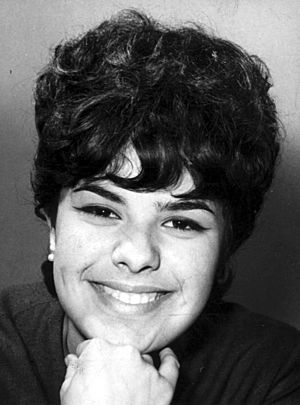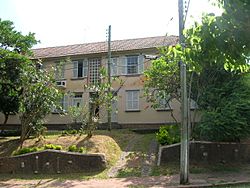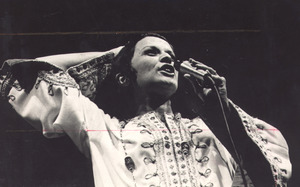Elis Regina facts for kids
Quick facts for kids
Elis Regina
|
|
|---|---|

Regina in 1964
|
|
| Background information | |
| Birth name | Elis Regina Carvalho Costa Zamperetti |
| Also known as | Pimentinha, Furacão |
| Born | March 17, 1945 Porto Alegre, Rio Grande do Sul, Brazil |
| Died | January 19, 1982 (aged 36) São Paulo, Brazil |
| Genres |
|
| Occupation(s) | Singer |
| Years active | 1961–1982 |
| Labels | Continental, CBS, Philips |
Elis Regina Carvalho Costa (born March 17, 1945 – died January 19, 1982) was a famous Brazilian singer. She was known for her amazing voice in MPB (Brazilian Popular Music) and jazz music. Elis Regina is also the mother of singers Maria Rita and Pedro Mariano.
She became very well-known in Brazil in 1965. This happened after she sang a song called "Arrastão" at a big TV festival. Soon after, she joined a popular TV show called O Fino da Bossa. People loved her powerful voice and how she performed on stage. Some of her most famous songs include "Como Nossos Pais," "Águas de Março," and "O Bêbado e a Equilibrista."
Her death at the age of 36 was a big shock for Brazil. Her son, Gabriel Borges Zamperetti, became an economist.
Contents
Elis Regina's Life Story
Elis Regina was born in Porto Alegre, Brazil. She started singing very young on a children's radio show called Clube de Guri. As a teenager, she signed a record deal. A few years later, she moved to Rio de Janeiro and recorded her first album.
In 1965, she won her first music festival with the song "Arrastão." This made her the best-selling Brazilian singer since Carmen Miranda. Her second album, Dois na Bossa, sold over one million copies. This was a record for Brazil! "Arrastão" helped her become even more popular because the festival was shown on TV and radio. This song also marked the start of música popular brasileira (Brazilian popular music).
In the late 1960s and early 1970s, Elis Regina helped make tropicalismo music popular. She worked with other famous artists like Gal Costa, Gilberto Gil, and Caetano Veloso.
Elis Regina was often called "hurricane" or "little pepper" because of her strong personality and powerful voice. She moved to Rio when Brazil was ruled by a military government. Even though she was very popular, she faced challenges for speaking her mind. In the 1970s, she recorded the album Elis and Tom in Los Angeles with Antonio Carlos Jobim, another legendary Brazilian musician.
Her Passing
More than 15,000 fans came to a special musical gathering at the Teatro Bandeirantes in São Paulo after her death. She was buried in Cemitério do Morumbi.
Later, in 2016, a movie called "Elis" was made about her life. The actress Andréia Horta played Elis Regina in the film.
Studio Albums
| Year | Album | Certifications |
|---|---|---|
| 1961 | Viva a Brotolândia | |
| 1962 | Poema de Amor | |
| 1963 | Ellis Regina | |
| 1963 | O Bem do Amor | |
| 1965 | Samba - Eu Canto Assim | |
| 1966 | Elis | |
| 1969 | Elis - Como e Porque | |
| 1970 | Em Pleno Verão | |
| 1971 | Ela | |
| 1972 | Elis | |
| 1973 | Elis | |
| 1974 | Elis & Tom (with Antônio Carlos Jobim) | |
| 1974 | Elis | |
| 1976 | Falso Brilhante | |
| 1977 | Elis | |
| 1979 | Essa Mulher | |
| 1980 | Saudade do Brasil | |
| 1980 | Elis |
Live Albums
Released During Her Life
| Year | Album | Certifications |
|---|---|---|
| 1965 | Dois na Bossa (with Jair Rodrigues) | |
| 1965 | O Fino do Fino (with Zimbo Trio) | |
| 1966 | Dois na Bossa nº 2 (with Jair Rodrigues) | |
| 1967 | Dois na Bossa nº 3 (with Jair Rodrigues) | |
| 1970 | Elis no Teatro da Praia | |
| 1978 | Transversal do Tempo |
Released After Her Passing
| Year | Album | Certifications |
|---|---|---|
| 1982 | Montreux Jazz Festival | |
| 1982 | Trem Azul | |
| 1984 | Luz das Estrelas | |
| 1995 | Elis ao Vivo | |
| 1998 | Elis Vive | |
| 2012 | Um Dia |
See also
 In Spanish: Elis Regina para niños
In Spanish: Elis Regina para niños
 | Tommie Smith |
 | Simone Manuel |
 | Shani Davis |
 | Simone Biles |
 | Alice Coachman |



